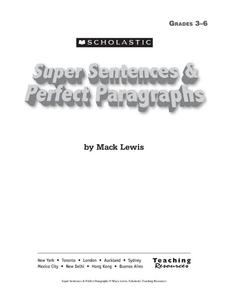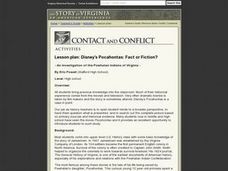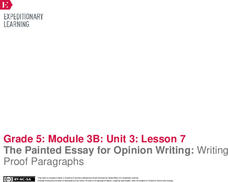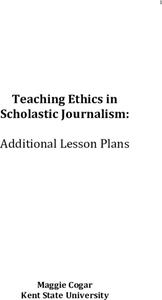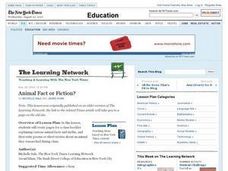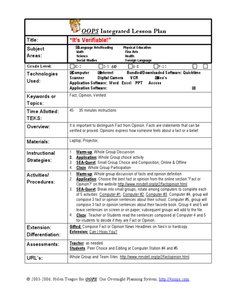Curated OER
Farming: It's a Fact
Understanding where our food and textiles come from is key to understanding business, economics, and the importance of modern agriculture. Learners play a game, read text to determine farm fact from opinion, and itemize a grocery receipt...
Houghton Mifflin Harcourt
Animal Habitats: Extra Support Lessons (Theme 4)
The activities and exercises in this packet, the third in the series of support materials for the Houghton Mifflin Harcourt thematic units on animal habitats, are designed for learners who need extra support with the basic concepts of...
Curated OER
Fact and Opinion
In this writing activity, students identify and describe the difference between a fact and an opinion. They place the cut-up words from the house ad in the correct column to indicate if they are fact or opinion.
Curated OER
Fact
Students read about polar bears and discuss and identify the facts they learn about them. In this facts lesson plan, students explain why their facts are not opinions.
Scholastic
Super Sentences & Perfect Paragraphs
An extensive collection of lessons and activities includes many writing, grammar, and proofreading exercises. With templates and worksheets that cover several steps in the writing process, from sentence to paragraph to essay, this...
Scholastic
Consider the Source
Who is more trustworthy when it comes to marijuana: a high school student, or The National Institute on Drug Abuse? Sources matter when reading informational text. Help teenagers discern which facts are true with an activity that focuses...
C-SPAN
Polling and Public Opinion
Most people are eager to offer their opinions about topics of interest, but what's the most effective way to collect and assess these opinions as a matter of fact? High schoolers learn about the history of polling, as well as the...
EngageNY
Identifying Author’s Opinion and Evidence: The Value of Sports in People’s Lives, Part I
Just like instant replay, it's time to take a closer look! Pupils work together to add ideas to a Close Readers Do These Things anchor chart. They then put their knowledge to the test as they read an informational article about the...
Curated OER
Opinion
An important concept for youngsters to learn is that there is a difference between facts and opinions. Use Kirsten Hall's Animal Touch to introduce the idea that an opinion is how one feels or thinks about something and that others are...
Curated OER
Disney's Pocahontas: Fact or Fiction?
Did you know that Pocahontas was 12 when Jamestown was established? Did you know that she later married John Rolfe? Did you know that she lived in London for two years? Did you know that she died of small pox? Class members study the...
EngageNY
The Painted Essay for Opinion Writing: Writing Proof Paragraphs
It's time to proof read! Pupils read and analyze proof paragraphs from a model essay. They then practice writing their own proof paragraphs to express an opinion about offshore oil drilling.
Curated OER
In Legal Limbo
Newspapers are great learning tools. They act as a conduit for current events, reading comprehension, and critical thinking. Here, pupils read a New York Times article regarding US immigration law under the Obama administration and...
Curated OER
The Value of Facebook
Does Facebook actually have any value? Find out what the New York Times thinks by reading this informational article. Learners use the 10 guiding questions to aid them as the read the provided article regarding the value of Facebook. Two...
Kent State University
Teaching Ethics in Scholastic Journalism
Events in recent years have underscored the importance of a free and independent press in a democracy. Young journalists engage in lessons about the function of journalism in a democratic society, practice the steps of Bok's Ethical...
Curated OER
Scapegoating and Othering
Scapegoating and "Othering" is the focus of a series of activities that ask groups to consider how these behaviors contribute to hatred and intolerance. Groups are given a scenario and discussion questions based on the situation. Whether...
Curated OER
Determining Author's Point of View: The Sneeches
Determine the author's point of view in a text. Young readers read Dr. Seuss' The Sneeches and identify the author's purpose in the story. They identify persuasive techniques in writing, asking and answering questions to better...
Curated OER
Animal Fact or Fiction?
Read and discuss the article "Welcome to Cicadaville (Enter at Your Own Risk)" to gain a better understanding around the confusion regarding cicadas and locust swarms. In groups your young analysts research statements about animals to...
The New York Times
Evaluating Sources in a ‘Post-Truth’ World: Ideas for Teaching and Learning about Fake News
The framers of the United States Constitution felt a free press was so essential to a democracy that they granted the press the protection it needed to hold the powerful to account in the First Amendment. Today, digital natives need to...
Curated OER
Author's Opinion
Fifth graders read a text about Amelia Earhart's father and use facts from the text to identify the author's opinion. For this author's opinion lesson plan, 5th graders complete a worksheet that is provided.
Curated OER
America Attacked: 9/11
In this America Attacked: 9/11 worksheet, students read the book America Attacked: 9/11 and complete fact and opinion, character detail, and short answer question activities. Students complete 26 questions.
Curated OER
Slumdog Millionaire
In this Slumdog Millionaire worksheet, students read the book Slumdog Millionaire and complete fact and opinion, character detail, and short answer question activities. Students complete 26 questions.
Curated OER
Electrifying Franklin
Fourth graders research and present information about Benjamin Franklin's life and accomplishments. For this lesson on Benjamin Franklin, 4th graders review idioms and sayings written by Franklin then compare and contrast his various...
Education Bureau of Hong Kong
Evaluating Casual Claims
Responsible decision making relies on the ability to a recognize, analyze, and evaluate claims. The worksheets and activities in this 32-page packet teach learners how to distinguish among opinions, reasoned arguments, facts, and logical...
Curated OER
"It's Verifiable!"
Students examine the differences between fact and opinion. They define fact and opinion, evaluate their favorite fact or opinion on a website, and in small groups write sentences using facts and opinions about school and their favorite...






